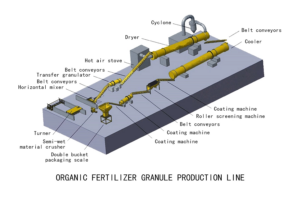At Xincheng, we understand that producing high-quality organic fertilizer granules requires careful control of various production factors. Our Granular organic fertilizer production line focuses on enhancing both efficiency and product quality through strategic process optimization. This includes raw material formulation, granulation speed, energy management, and quality control systems. In this article, we’ll explore effective methods to improve the organic fertilizer manufacturing process.
Raw Material Selection and Preprocessing Techniques
The foundation of efficient fertilizer granulation begins with the selection and preprocessing of raw materials. In our fertilizer granulation equipment for organic production, we emphasize the importance of mixing organic and inorganic materials in optimal proportions. This helps achieve consistent nutrient content, which is vital for both granule formation and soil enrichment. Preprocessing techniques, such as moisture control and the use of additives, ensure the materials are ready for granulation. Properly prepared materials can lead to better pellet integrity and a smoother production flow.
Controlling Granulation Speed, Moisture, and Particle Uniformity
Achieving consistent granule size and uniformity is crucial for both storage and efficient crop absorption. The Granular organic fertilizer production line from Xincheng is designed to give precise control over granulation speed and moisture levels, ensuring uniform pellets. By maintaining optimal moisture content and regulating the rotation speed of the granulation machine, the equipment produces granules with consistent size and strength. This contributes to better fertilizer release and reduces the risk of clumping during storage.
Energy Consumption and Operational Efficiency
Reducing energy consumption while maintaining operational efficiency is a priority in organic fertilizer production. Xincheng’s fertilizer granulation equipment for organic production is designed with energy-saving technologies to optimize power usage without compromising productivity. Our systems are engineered to minimize waste and maximize output, which not only reduces operational costs but also supports sustainable practices. Regular maintenance and operational monitoring also ensure the machinery is running at peak efficiency, further enhancing production timelines.
Quality Control and Final Product Inspection
At Xincheng, we prioritize product quality through rigorous testing and monitoring systems. Every batch of organic fertilizer is subjected to thorough quality checks, including size analysis and nutrient content evaluation. Our Granular organic fertilizer production line incorporates real-time monitoring to detect inconsistencies in granule size or moisture levels, allowing for immediate adjustments. This ensures that every granule meets the required standards for agricultural use, improving crop yields and plant health.
Conclusion: Boosting Competitive Edge through Process Refinement
In conclusion, optimizing the organic fertilizer granulation process is a key strategy for enhancing product quality and operational efficiency. By focusing on raw material formulation, granulation conditions, energy usage, and quality control, Xincheng helps improve the overall productivity of organic fertilizer production. Continuous innovation and process refinement not only reduce costs but also strengthen the competitiveness of businesses in the organic fertilizer industry. By integrating these strategies, manufacturers can ensure high-quality, efficient fertilizer production that benefits both the environment and agricultural performance.







